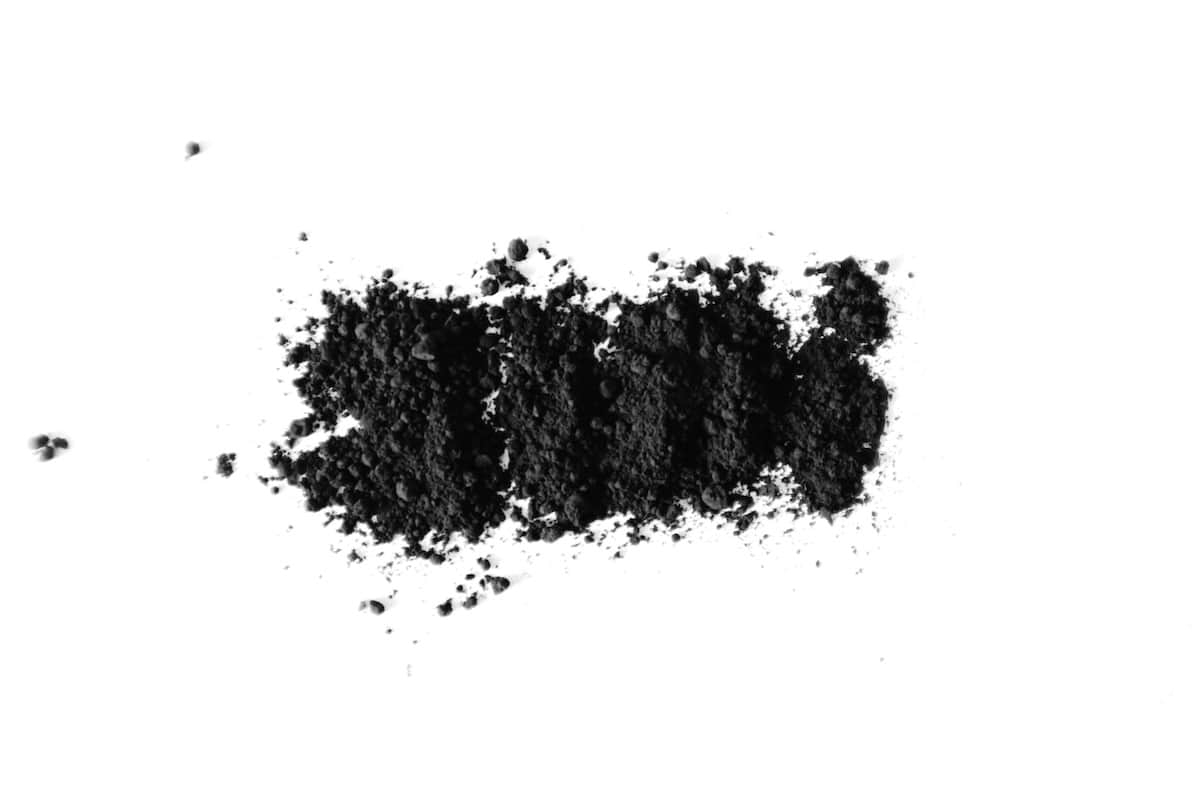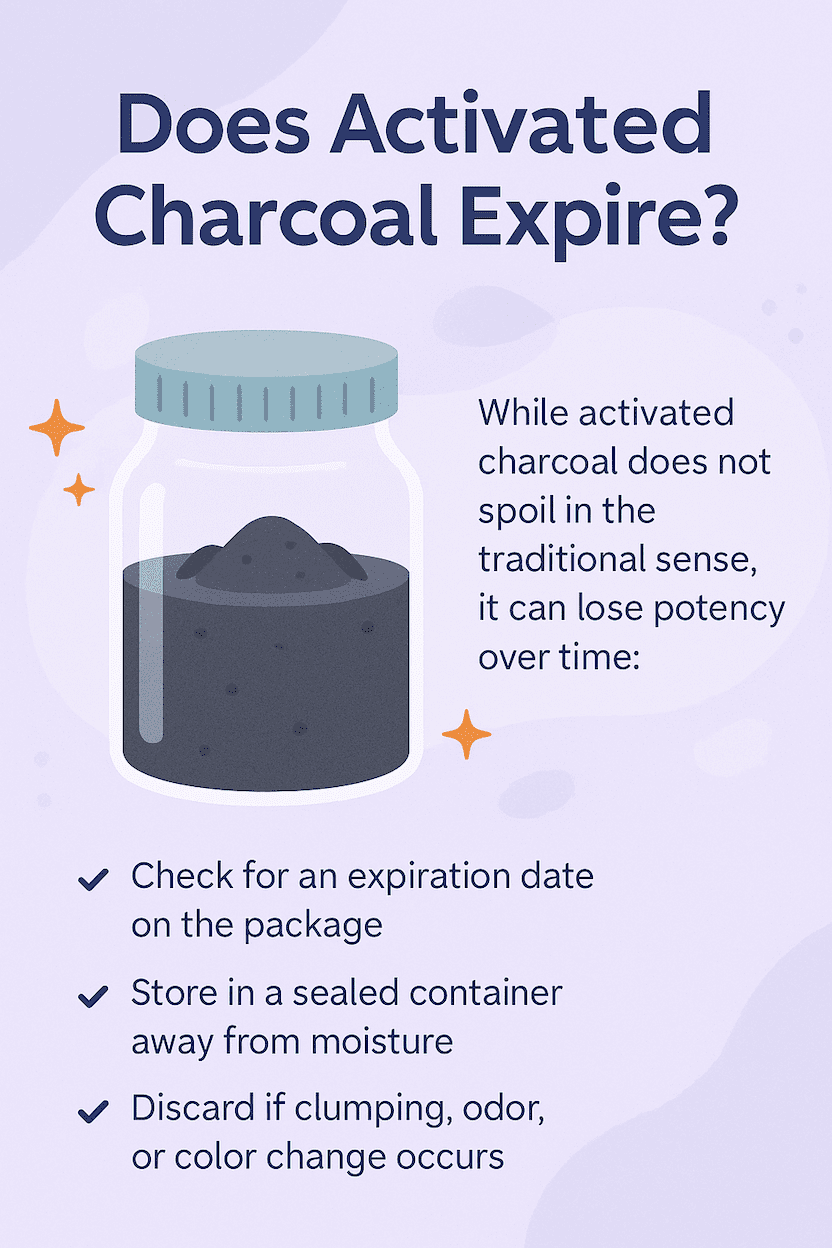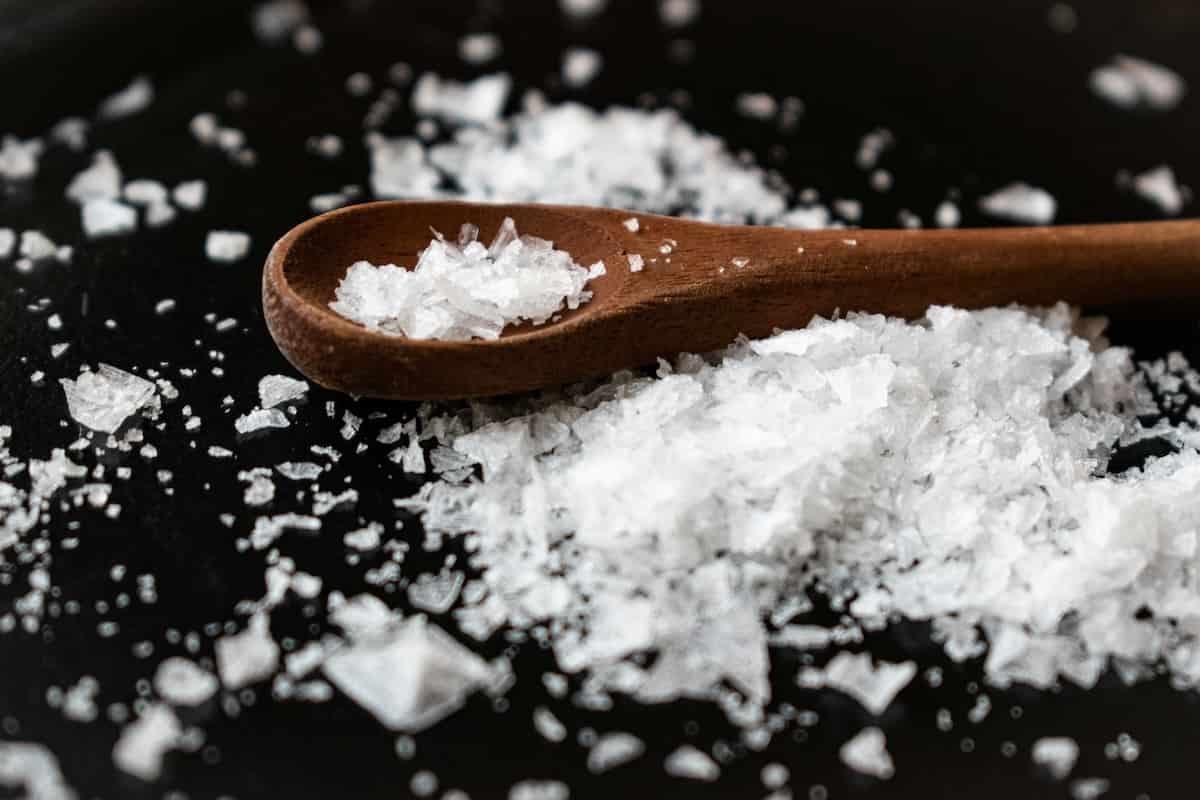Last update: November 4, 2025
5 minute read
Does Activated Charcoal Expire? What You Need to Know
Think charcoal stays useful forever? Learn whether activated charcoal really expires, and how to tell if yours has lost potency.

By Derick Rodriguez, Associate Editor
Edited by Yerain Abreu, M.S.

Ever find an old bottle of charcoal powder and wonder if it still does anything? It sits in the back of the pantry, black as ever, but the question sticks: Can activated charcoal actually expire, or is it basically immortal? The answer is both simple and slightly frustrating—it doesn’t spoil, but it can become useless.
This guide breaks down how long activated charcoal stays effective, what makes it lose strength, and if that “expired” date on the label even matters.
Key takeaways
- Activated charcoal doesn’t chemically expire, but it can lose potency if exposed to air or moisture
- Most products list a 1–3 year shelf life for quality control, not safety concerns
- Signs of weakened charcoal include clumping, odor, or poor performance
What is activated charcoal?
Activated charcoal (also called activated carbon) is a form of carbon processed (often by high heat) to create a massive network of microscopic pores. Those pores give it a vast surface area that lets it bind and hold molecules (this is called adsorption, not absorption: molecules stick to the surface rather than being soaked into it).
Because the carbon structure is basically elemental carbon, it doesn’t “go bad” in a chemical decomposition sense. But here’s the catch: those pores can become filled with stuff from the environment, like moisture, dust, gases, which diminishes their capacity to bind new substances.
So, in practice, activated charcoal may lose effectiveness over time, even if it doesn’t “expire” in the usual sense.

Does activated charcoal have a shelf life?
Technically, no: the carbon itself is stable. But in real-world products, most manufacturers assign a shelf life (commonly 1 to 3 years) as a guideline to ensure potency.
Why that range?
- Once you open the package, charcoal starts adsorbing from ambient air (moisture, volatile compounds) and gradually “fills up” its pores.
- Packaging quality and storage conditions vary. Some containers might not block moisture or gases well.
- Some products mix charcoal with excipients (fillers, binders) that may degrade or affect the formulation.
So the shelf life is more of a practical window in which you can expect it to still be “near full strength.” After that, it might work, just less efficiently.
What degrades effectiveness — not safety
Let’s compare safety versus effectiveness when charcoal “ages”:
Factor | What can go wrong | Impact on safety or potency |
|---|---|---|
Adsorbed impurities (moisture, gases, dust) | Pores become occupied | Lower adsorption capacity (less effective) |
Exposure to humidity | Clumping, loss of dryness | May degrade binding; moisture itself isn’t harmful, but it reduces function |
Packaging leaks or damage | Contaminants in container | Could introduce particles, odor, or reduce performance |
Degraded excipients (if product is a blend) | In blended capsules, tablet matrix weakens | Could affect disintegration or release |
Microbial growth | (Very unlikely purely on carbon, unless in mixed product) | Usually not a safety hazard for pure charcoal |
So far, no strong evidence says old charcoal will actively harm you, unless it’s contaminated. The bigger issue is that it might not do much anymore.
How to tell if your activated charcoal is “spent”
Here are signs that your charcoal is no longer at peak performance:
- Clumping or caking: It no longer flows freely.
- Moisture or wet feel: If you sense dampness, it’s likely absorbed humidity.
- Odor or off-smell: It may have adsorbed volatile compounds.
- Less effect in use: If in water or air filter form, reduced absorption, weaker performance.
- Color changes: Though less common, look for paling (less black) or dusty residue.
You can also test it with a simple experiment: Mix a bit into water (or the medium you use it with) and see how well it absorbs compared with fresh charcoal under the same conditions. If it seems weak, consider replacing it.
How to store activated charcoal so it stays potent
Here are tips to prolong the life (and potency) of your charcoal:
- Keep it in an airtight, opaque container (glass jars with rubber seals or Mylar/foil pouches work well).
- Store in a cool, dry place, away from heat, humidity, or strong odors (charcoal will suck them up).
- After opening, minimize exposure—open only when needed, reseal immediately.
- If the original packaging is plastic and not fully airtight, transfer it. Many plastics slowly allow gases and moisture through.
- Consider labeling with the date opened so you can track time in use.
- For filters or charcoal bags (used for deodorizers or air purification), “reactivating” by heating under industrial conditions is possible, but not trivial at home. Ordinary ovens can’t reliably regenerate the pore structure.
If you follow that, your charcoal might remain reasonably effective well beyond the “1–3 year” window, though you may want to rotate stock or refresh periodically.
Frequently asked questions (FAQ)
Here are some of the most frequently asked questions about activated charcoal.
Final thoughts
Activated charcoal doesn’t “expire” in the usual sense. Its carbon structure is stable. But over time and with exposure, its pores can gradually fill up and reduce its effectiveness. That makes storage your best defense.
You don’t need to toss everything once you cross a printed date, but you do want to pay attention to appearance, smell, and performance. In a personalized wellness routine, replacing at a thoughtful interval ensures you get the full benefit when you need it most.
VitaRx is here to help you choose quality products, store them wisely, and adjust your regimen based on real-life signals—not rigid rules.
Sources and references
Editor

Derick Rodriguez
Derick Rodriguez focuses on editing health and wellness-related content. With over half a decade of experience in the digital realm, Derick has developed a unique skill set that bridges the gap between complex health concepts and accessible, user-friendly communication. His approach is deeply rooted in leveraging personal experiences and insights to illuminate the nuances of health and wellness topics, making them more approachable and empowering readers with knowledge and confidence.
Editor

Yerain Abreu
Yerain Abreu is a content strategist with over seven years of experience. He earned a Master's degree in digital marketing from Zicklin School of Business. He focuses on medical and health-related content, working with top healthcare professionals to ensure content is engaging and reliable.
At VitaRx, we're not just passionate about our work — we take immense pride in it. Our dedicated team of writers diligently follows strict editorial standards, ensuring that every piece of content we publish is accurate, current, and highly valuable. We don't just strive for quality; we aim for excellence.
Related posts
While you're at it, here are some other relevant articles you might be interested in.

Get your personalized vitamin recommendations in less than
5 minutes.
Get your personalized vitamin recommendations in less than
5 minutes.






